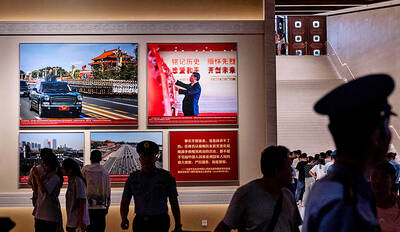The major defects found in the high-speed rail system as outlined by a dismissed inspection committee were corrected before the Taiwan High Speed Rail Corp (THSRC) was given official permission to begin operating, an official said yesterday.
"We will prepare a report [on how the defects were rectified] within one week and mail that report to the inspection committee members," Vice Minister of Transportation and Communications (MOTC) Ho Nuan-hsuen (
Ho made the remarks while being questioned by a group of Chinese Nationalist Party (KMT) lawmakers regarding the safety of the new rail system.
The high speed rail inspection committee concluded its inspection report on Nov. 28, saying that six conditions needed to be met before the rail system could become operational.
Among those conditions was the need to address 33 major defects found in the system.
Barred
After their dismissal, committee members were barred from participating in the test run or from taking part in the meeting that was held after the test to review the defects.
The MOTC issued the go-ahead for the train on Sunday upon approval by Lloyd's Register Rail and three Japanese consultants.
Pan-blue lawmakers alleged that the MOTC had shunned the inspection committee.
No disclosure
On Dec. 20, the convenor of the inspection committee, Lin Zone-ching (林榮慶), issued a statement in which he accused the THSRC of refusing to disclose how it intended to deal with the deficiencies that had been discovered by the committee.
"The fact that the inspection committee was unable to ascertain that the 33 defects that it had identified were dealt with appropriately is cause for concern," KMT Legislator Lai Shyh-bao (
Ho said that the MOTC and the three Japanese consultants determined on Dec. 24 that the 33 deficiencies had been addressed appropriately.
"I take full responsibility for issuing the green light for the high-speed rail, because it is my duty," Ho told KMT lawmakers.

Three batches of banana sauce imported from the Philippines were intercepted at the border after they were found to contain the banned industrial dye Orange G, the Food and Drug Administration (FDA) said yesterday. From today through Sept. 2 next year, all seasoning sauces from the Philippines are to be subject to the FDA’s strictest border inspection, meaning 100 percent testing for illegal dyes before entry is allowed, it said in a statement. Orange G is an industrial coloring agent that is not permitted for food use in Taiwan or internationally, said Cheng Wei-chih (鄭維智), head of the FDA’s Northern Center for

The Chinese military has built landing bridge ships designed to expand its amphibious options for a potential assault on Taiwan, but their combat effectiveness is limited due to their high vulnerability, a defense expert said in an analysis published on Monday. Shen Ming-shih (沈明室), a research fellow at the Institute for National Defense and Security Research, said that the deployment of such vessels as part of the Chinese People’s Liberation Army (PLA) Navy’s East Sea Fleet signals a strong focus on Taiwan. However, the ships are highly vulnerable to precision strikes, which means they could be destroyed before they achieve their intended

About 4.2 million tourist arrivals were recorded in the first half of this year, a 10 percent increase from the same period last year, the Tourism Administration said yesterday. The growth continues to be consistent, with the fourth quarter of this year expected to be the peak in Taiwan, the agency said, adding that it plans to promote Taiwan overseas via partnerships and major events. From January to June, 9.14 million international departures were recorded from Taiwan, an 11 percent increase from the same period last year, with 3.3 million headed for Japan, 1.52 million for China and 832,962 to South Korea,

REWRITING HISTORY: China has been advocating a ‘correct’ interpretation of the victory over Japan that brings the CCP’s contributions to the forefront, an expert said An elderly Chinese war veteran’s shin still bears the mark of a bullet wound he sustained when fighting the Japanese as a teenager, a year before the end of World War II. Eighty years on, Li Jinshui’s scar remains as testimony to the bravery of Chinese troops in a conflict that killed millions of their people. However, the story behind China’s overthrow of the brutal Japanese occupation is deeply contested. Historians broadly agree that credit for victory lies primarily with the Chinese Nationalist Party (KMT)-led Republic of China (ROC) Army. Its leader, Chiang Kai-shek (蔣介石), fled to Taiwan in 1949 after losing a